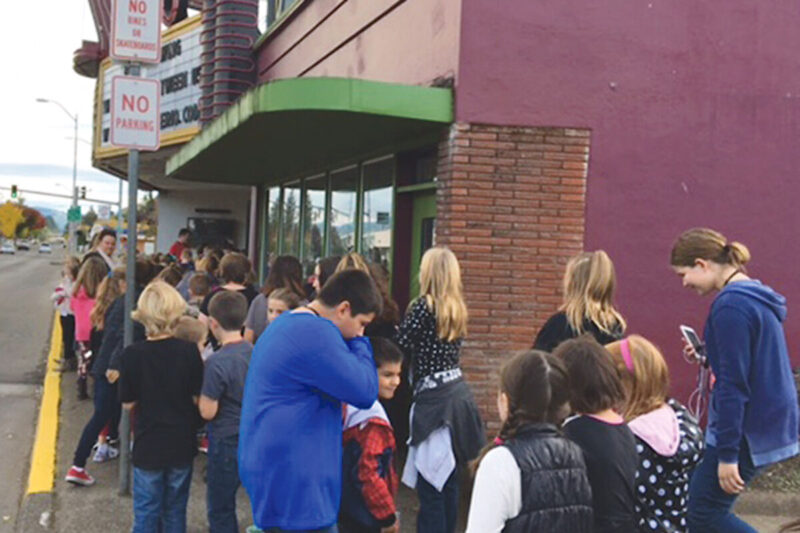Sean C. Morgan
Sweet Home School District officials often hear from Supt. Tom Yahraes that what they focus on is what they’ll get, so they’re looking for more ways to promote and reinforce positive behavior in each building.
Hawthorne Elementary has had its “shout outs.” Foster Elementary and Sweet Home Junior High have their “Be Kind” programs. Last year, Holley Elementary implemented its “self-managers” program.
Oak Heights Elementary has added a self-managers program this year.
“It’s a program that Supt. Yahraes ran when he was a principal,” said Oak Heights Principal Josh Dargis. He brought it up a while back to district administrators.
Self-managers programs have been around for years, he said. Dargis’ wife used to teach in Oakland. That school ran it, and people loved it.
“One of my teachers, in her previous spots she used it,” Dargis said.
Teacher Julie Jefferson, who is teaching second-graders this year after teaching fifth grade last year, implemented the principles in her classroom.
“I was able to see it in the classroom.”
Holley Principal Todd Barrett implemented a similar program last year.
When kids are doing a great job, “I wanted to find a way to recognize them,” Barrett said. “We took the idea from Tom (Yahraes), and we wrote applications.”
Dargis and his staff decided to use it school-wide this year. Counselor Yosef Cohen handled most of the implementation.
“The goal of the program is to recognize students who are respectful, responsible and kind all the time,” Dargis said. Generally, those kids are going to be good regardless of whether the program is in place, but it can move more students into that category.
“Even our kiddos who struggle and have things they need to work on are applying,” he said. They’re motivated, and it’s “giving them all a nudge.”
Oak Heights staff members are hoping it will sway the behavior of students who are on the edge, nudge them toward better behavior, Dargis said. It’s the same idea as “Be Kind,” which he ran while vice principal at the Junior High: Praise the students for doing something positive and hope it gets them to keep repeating the behavior.
“It’s about building character in the kids,” Dargis said. “It’s about promoting kindness and respect.”
“We wanted to raise the level of expectations of students in the building and shine a spotlight on them,” Barrett said.
Previously, staff spent a lot of time working with students who were getting in trouble, Barrett said. Shifting the focus hasn’t changed the number of referrals much, but it has changed the attitude in his school.
“The more you look at something and give it attention, the more of it you see,” Barrett said – repeating a maxim Yahraes often utters.
Like “Be Kind” – it reinforces repeated positive behavior and builds good habits, Dargis said.
To be labeled self-managers, students fill out and turn in applications. The applications contain a self-evaluation with check boxes in three areas, “respect,” “responsibility” and “safety,” which are addressed by the Positive Behavioral Interventions and Supports system currently employed in district elementary schools.
The program works hand-in-hand with the PBIS program, which also rewards positive behavior, Dargis said. Self-managers is just another way to recognize students.
Each check box is a specific characteristic required to be a self-manager. The checklists from the lower hall, first through third grade, are different than for fourth- through sixth-graders in the upper hall, Dargis said. Kindergarten students have a separate list.
The student must have a parent and another non-teacher sign off on the application.
The student’s teacher then considers the application and either grants the self-manager title or has a detailed conversation with the student as to why he or she did not qualify. The teacher explains specific instances why.
It’s not personal, Barrett said. It gives teachers and students a discussion that is based on their skills.
“Them being recognized is a lot of motivation,” Dargis said, but the self-manager designation comes with additional privileges.
Self-managers will help in the student store, serve as hall monitors and help with kindergarten students, Dargis said. They line up first for recess, and there will be monthly parties for self-managers.
A big thing for Dargis is how it is changing the language of the school.
If a student or a whole classroom is walking quietly down the hallway, a staff member will say something about them being good self-managers. Students are using the language too.
Of 305 students, 70 have applied and been recognized as self-managers so far this year, Dargis said. “That’s a good number for the start of the year, as the kids are figuring it out.”
It’s an ongoing incentive too.
“You’ve got to keep living up to those expectations,” Dargis said. If a student starts getting referrals or something else, they’ll be re-evaluated as self-managers.
Holley set a goal of identifying 10 self-managers out of about 160 students at the beginning of last school year, Barrett said. “We ended up with 42.”
At Holley, students receive a self-manager bracelet and a badge they can design, Barrett said. Those serve as a permanent hall pass, allowing students to visit the office or restroom.
They receive other privileges as well. Coming up, self-managers will chaperon a first- and second-grade field trip to a pumpkin patch.
As of Monday 12 had applied and will be the school’s first self-managers of this school year.
“We’ve got a lot of work to do,” Barrett said, but “I think it’s a positive change for sure.”





